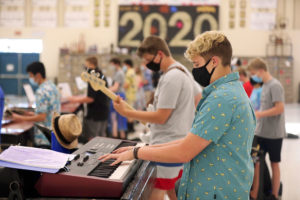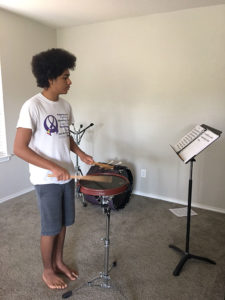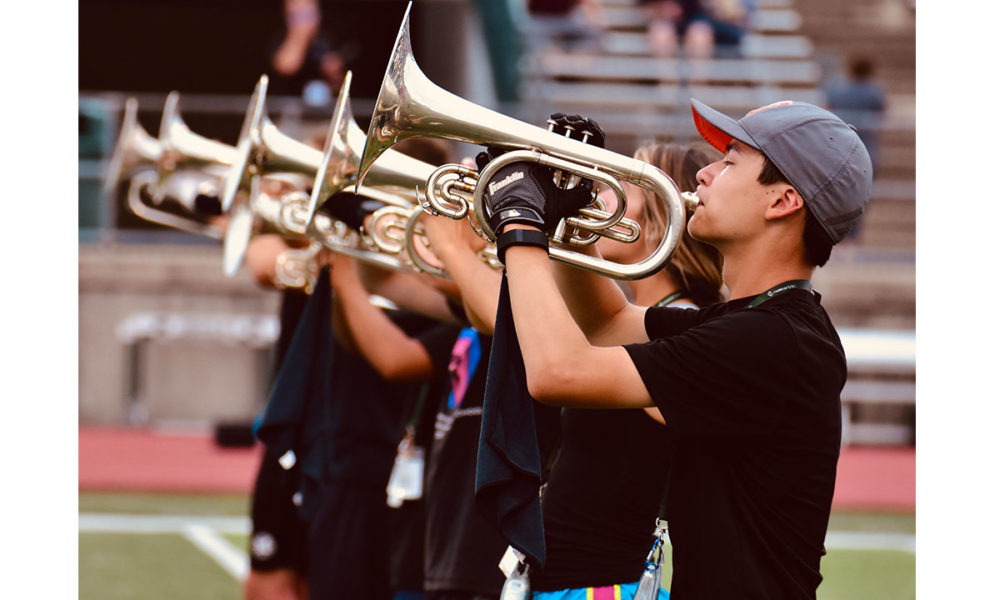High School band directors made tough choices about their 2020 fall marching seasons as traditional plans shifted due to COVID-19.
During one of the hottest summers on record, some students had an unusually cool band camp as they marched inside their own bedrooms.
While most directors admit that online marching band rehearsals are far from ideal, the COVID-19 pandemic left them turning to public health guidance and their own creativity. Top high school bands across the country have moved forward in many different ways with safety and engagement as top priorities.
“The most important thing is for kids to interact on some level,” says Charles Pisarra, director of bands and associate director of fine arts at Union High School in Tulsa, Oklahoma.
Alternative Seasons
As the 2020-2021 school year began, school districts implemented several different learning models: distance learning, in-person with limitations, combined in-person and online instruction, and altered schedules. Bands of America, USBands, and other competitive marching circuits transitioned 2020 championships into virtual opportunities while the Texas University Interscholastic League (UIL) delayed its championships, modified its contest regulations, eliminated full retreats, and increased time between bands.
Many bands’ strategies echoed the circumstances around them. High infection rates in Union’s surrounding county kept the band rehearsing virtually all summer. Even given the conditions, the decision was difficult, Pisarra recalls. “No matter what, you’re going to disappoint people, and there are going to be students and parents who disagree with you,” he says.
The Union band chose to focus on fundamentals and technique rather than learning a new show. The band’s performance opportunities have been limited to three home games, starting in October. Pisarra says the whole band likely wouldn’t participate in each game.
 Avon (Indiana) High School tried to maintain normalcy, says Jay Webb, director of bands. After a virtual training regimen in June, the band started modified in-person rehearsals on July 6. The ensemble is working on a new show, “Vintage,” inspired by Frank Sinatra’s song, “Young at Heart,” and featuring pieces from some of Avon’s previous shows.
Avon (Indiana) High School tried to maintain normalcy, says Jay Webb, director of bands. After a virtual training regimen in June, the band started modified in-person rehearsals on July 6. The ensemble is working on a new show, “Vintage,” inspired by Frank Sinatra’s song, “Young at Heart,” and featuring pieces from some of Avon’s previous shows.
While shorter than usual, the program still offers complexity and detail, Webb says. “One day the pandemic will be over, and we would like to be the same Avon we were before,” he says.
The Round Rock (Texas) Independent School District began school online for three weeks, then gave parents a choice to continue virtually or in person. After preliminary numbers showed that 70 percent of students would be learning virtually and 30 percent face-to-face, the band decided to create a virtual project, honoring “everyday heroes,” rather than performing a traditional show.
“We [are] asking our students who their heroes are, then gathering photos, videos, written accounts and perhaps interviews with these folks,” says Director David Mobley. “We’ll incorporate these stories and scenes into a longer video that features our students performing from their homes. We are using some fantastic and well-known pieces that evoke the heroic ideal and journey.”
The Woodlands, Texas, high school band hopes to participate in UIL competitions, says Director Joni Perez. Though school was completely virtual through Sept. 7, the district allowed in-person afternoon rehearsals. “We have been fortunate to be able to see our students …, which I realize is not what everyone has experienced,” Perez says.
To replace canceled competitions, the William Mason (Ohio) High School band decided to plan several “showcase” performances, including its own independent invitational. The group hopes to incorporate meaningful traditions, like senior recognition and senior walk, into these events. “It’s important to have a destination as we work through the fall,” says Jason Sleppy, marching band director.
To operate its invitational safely, Mason has limited attendance to 50% capacity, with plans to clear the stands every hour to allow for social distancing.
Other bands moved the marching season forward one semester. The Leander (Texas) High School Band will be working on a student-created spring marching band show, says Robert Selaiden, director of bands. Therefore, the band cut rehearsal time in half to avoid overwhelming students at the start of school. During the first semester, the band will be focusing on students’ individual performance skills through work on solos and audition material. The adjusted curriculum allows for more flexibility. “We can easily adapt from online to in-person or even run both of them at the same time,” Selaiden says.
 The Claudia Taylor Johnson band in San Antonio, Texas, is creating a “refresh” of two favorite shows, 2010’s “You Are …” and 2014’s “Chameleon,” according to Jarrett Lipman, director of bands. While it will participate in UIL contests, its primary focus is working on a show that the students will enjoy performing for family and friends.
The Claudia Taylor Johnson band in San Antonio, Texas, is creating a “refresh” of two favorite shows, 2010’s “You Are …” and 2014’s “Chameleon,” according to Jarrett Lipman, director of bands. While it will participate in UIL contests, its primary focus is working on a show that the students will enjoy performing for family and friends.
New Rehearsal Protocols
When you’re marching through a pandemic, rehearsals look different. At in-person rehearsals, all of Avon’s staff members wear masks and prohibit sharing equipment or supplies. The band staggered students’ report times and rehearsed in smaller groups to limit the number of people on campus. It even adapted drill and other exercises to accommodate social distancing.
Mason students complete temperature and wellness checks before the start of each rehearsal and keep hand sanitizer on them at all times, Sleppy says. If Leander rehearses in person, students will be spaced 10 feet apart, covers will be put on instrument bells, and flute players will use face shields, Selaiden says.
The Mason and Round Rock bands both included major virtual components in their camps. They featured clinicians, question-and-answer sessions, and even opportunities for students to learn about topics like composition and sound design. Round Rock partnered with other high schools in the district to offer more than 300 sessions throughout the camp.
Union concentrated on the fundamentals of marching, tone production, and technique during online band camp sessions. Since the students participated from their homes, the band focused on rudimentary skills like taking a single step forward. Sessions began in the web conferencing platform with students together. Then members separated into breakout rooms for more individualized instruction, Pisarra says. Each breakout room had two instructors, one to teach concepts and one to watch the students execute them.
Bands also implemented creative means for borrowing instruments, such as drive-through pickups at Claudia Taylor Johnson. “It was great to see them for a few minutes even if just at their vehicles,” Lipman says.
Financial and Social Adjustments
Major modifications to the season result in big financial changes. Though cancellations and restrictions can be disappointing, students and parents may be happy about at least one adjustment—band is cheaper. Many bands and booster clubs gave refunds or reduced fees after planning seasons that have little travel and less expenses.
At Mason, the band intentionally sought out ways to reduce the year’s costs. For now, Union band students only need to pay for a $10 subscription to SmartMusic, an online music learning program. Leander reduced fees to fit each child’s chosen level of participation, ranging from fully in-person to fully virtual.
On the social front, student leaders are rising to the occasion to keep band members connected. Though incoming freshmen and new members need time to acclimate to their high school marching band’s dynamics, section hangouts and long hours together traditionally bond students quickly. Now, relationships are built from a distance, whether at picnic lunches six feet apart or through online team-building sessions.
“We need to do everything we can right now to promote the community and family culture in our program,” Perez says.
Most directors say that they have relied on student leadership even more than usual to keep their fellow members connected. “With our leaders, our focus has been on the factors that are in our control and identifying what makes marching band a special experience,” Sleppy says.
Some bands, like Mason, Claudia Taylor Johnson, and The Woodlands, established systems for student leaders to check in on their peers. Student leaders hold weekly Zoom meetings, lead socially distanced workout sessions, or simply focus on sending personal messages of encouragement.
“When they can’t be together, we have to make specific time to connect,” Sleppy says.
Union band students even organized an arts and crafts origami session. “We’re getting a little creative, and honestly, for the most part, it has little to do with music,” Pisarra says.
Many of the bands are already seeing the success of these student-led endeavors. Though most students were a little suspicious going into Round Rock’s virtual summer band camp, the freshmen actually attended at the highest rates and built bonds quickly, Mobley says.
Almost all the directors say that motivating their highly driven students through an unusually quiet season has been difficult since their bands typically perform at major regional, state, and national events. “Three home games are not going to cut it for them,” Pisarra says, “but just because I can’t motivate them doesn’t mean I can’t engage them, and maybe that engagement becomes the motivation.”


